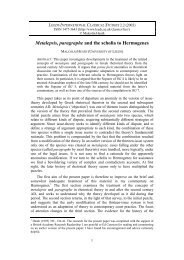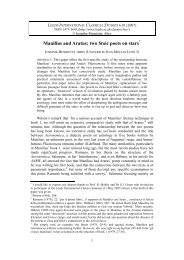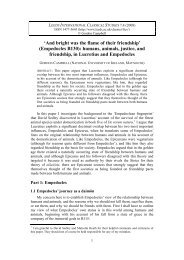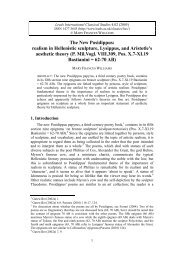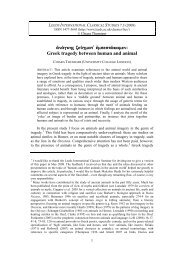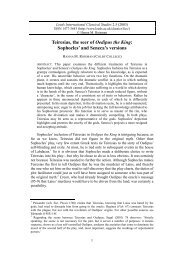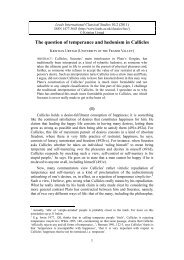Revisiting Tarpeia's myth in Propertius (IV, 4) - Leeds International ...
Revisiting Tarpeia's myth in Propertius (IV, 4) - Leeds International ...
Revisiting Tarpeia's myth in Propertius (IV, 4) - Leeds International ...
You also want an ePaper? Increase the reach of your titles
YUMPU automatically turns print PDFs into web optimized ePapers that Google loves.
MYRTO GARANI, REVISITING TARPEIA’S MYTH IN PROPERTIUS (<strong>IV</strong>, 4)<br />
<strong>in</strong>tertextual equivalents, i.e. Vergilian Venus and Juno, Vesta is the one who<br />
eventually fallit Tarpeia, this time by way of her transformation from goddess of<br />
elegiac love to agent of Empedoclean Strife. This radical twist po<strong>in</strong>ts to<br />
<strong>Propertius</strong>’—so far disregarded—witty Callimachean <strong>in</strong>terplay with<strong>in</strong> the elegy. 57<br />
In addition, the <strong>in</strong>novative generic amalgamation of elegy with philosophical<br />
elements po<strong>in</strong>ts to the experimental Callimachean style that <strong>in</strong> fact pervades Book<br />
4. 58 At the same time, once Vesta’s Empedoclean function as the agent of Strife is<br />
disclosed and the catalytic impact of her <strong>in</strong>tervention upon the political changes is<br />
underscored, the ostensibly strict dichotomy between patriotic shell and amatory<br />
content of the elegy, which is often <strong>in</strong>sisted on by scholars, is obliterated. In l<strong>in</strong>e<br />
with this, <strong>Propertius</strong> is conceivably revealed as approv<strong>in</strong>g of violence such as this<br />
experienced <strong>in</strong> the course of civil wars as a means of political progress; and so at<br />
least <strong>in</strong> the elegy <strong>in</strong> question his patriotic aspirations are fulfilled.<br />
This paper started as an exploration of Tarpeia’s <strong>myth</strong> <strong>in</strong> <strong>Propertius</strong> and Ovid.<br />
Surpris<strong>in</strong>gly, this exploration has resulted <strong>in</strong> track<strong>in</strong>g down different embodiments<br />
of Empedoclean Love and Strife, modified accord<strong>in</strong>g to generic criteria. With<strong>in</strong><br />
this framework, <strong>Propertius</strong>’ place with<strong>in</strong> the stemma of Empedocles’ <strong>in</strong>tertextual<br />
reception has been def<strong>in</strong>ed, and the impact that his <strong>in</strong>tertextual embrac<strong>in</strong>g of<br />
philosophical elements had upon his aetiological plan has been discussed. At the<br />
same time, Ovid’s double response, once <strong>in</strong> epic, once <strong>in</strong> elegiac—and thus self<strong>in</strong>vert<strong>in</strong>g—terms,<br />
has been shown to form part of his multi-layered reception of<br />
Empedoclean ideas. By means of this <strong>in</strong>novative mixture of philosophical and<br />
playful elements with<strong>in</strong> the broader framework of aetiological elegiac poetry,<br />
which was first found <strong>in</strong> <strong>Propertius</strong>, Ovid redef<strong>in</strong>es <strong>in</strong> his turn the genre of elegy<br />
and gives it a new twist.<br />
Myrto Garani<br />
National and Kapodistrian University of Athens, Greece<br />
mgarani@phil.uoa.gr<br />
Bibliography<br />
Arieti, J.A. (1980) ‘Empedocles <strong>in</strong> Rome: Rape and the Roman Ethos’, Clio 10:<br />
5-20.<br />
Baker, R.J. (1968) ‘Miles annosus: The Military Motif <strong>in</strong> <strong>Propertius</strong>’, Latomus 27:<br />
322-49.<br />
Barber, E.A. (1960) Sexti Properti Carm<strong>in</strong>a, ed. 2 (Oxford).<br />
Barchiesi, A. (1991-1992) ‘Discordant Muses’, PCPhS 37: 1-21.<br />
Beard, M. (1980) ‘The Sexual Status of Vestal Virg<strong>in</strong>s’, JRS 70: 12-27.<br />
57 Pill<strong>in</strong>ger (1969) 177, Miller (1982) 382. For a latent Callimachean presence <strong>in</strong> another<br />
aetiological elegy of Book 4 (<strong>IV</strong>.10) which has also been considered mostly un-Callimachean see<br />
Garani (2007b).<br />
58 Pill<strong>in</strong>ger (1969) 174, 178. For a blend<strong>in</strong>g of different genres—this time elegy with epic—see<br />
Hercules’ elegy (<strong>Propertius</strong> <strong>IV</strong>.9) with Warden (1982) 235.<br />
17



